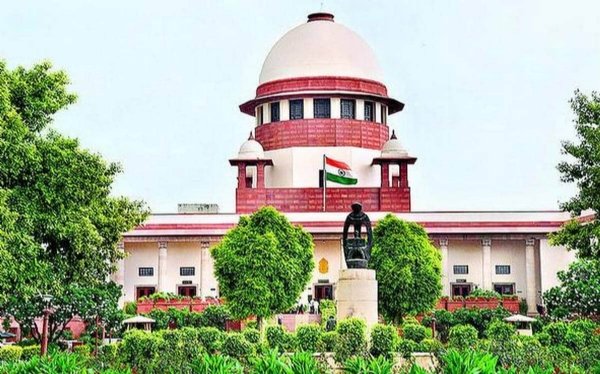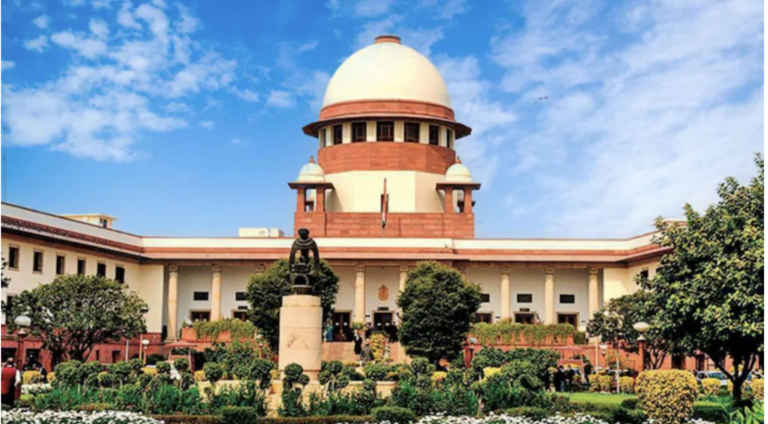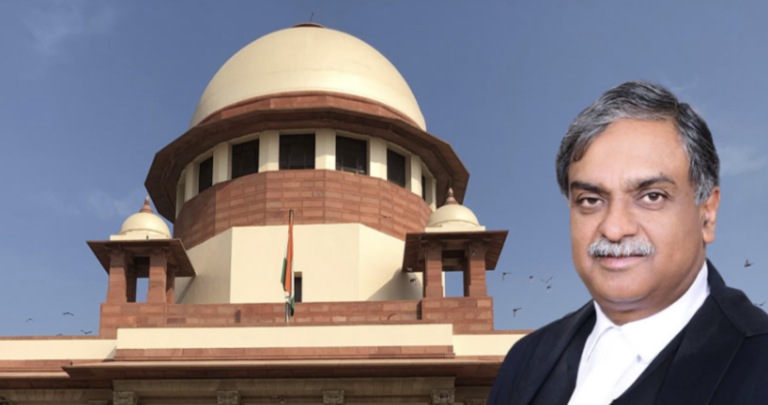Bar Council Member Adv. Aashish Deshmukh, impersonates himself as a Judge – Supreme Court Quashes Order, Litigants Demand Prosecution

Supreme Court & High Court Litigants Association has demanded the prosecution of Adv. Aashish Deshmukh under Sections 420, 192, 193 IPC and other allied provisions, and has further sought initiation of contempt proceedings for his unlawful act of impersonating a Judge and passing orders without jurisdiction.
New Delhi, 24th September 2025:
The Supreme Court on Tuesday quashed the disciplinary proceedings initiated by the Bar Council of Maharashtra & Goa (BCMG) in Disciplinary Case No. 27 of 2023, dismissed the petition filed by BCMG, and imposed costs of ₹1 lakh on the Council.
The apex court also strongly condemned the order dated 06.07.2023 passed by BCMG member Adv. Aashish Deshmukh, who had pass said unlawful order referring a complaint for inquiry under Section 35 of the Advocates Act, 1961.
After the Supreme Court quashed the proceedings, the Supreme Court & High Court Litigants Association has demanded the prosecution of Adv. Aashish Deshmukh under Sections 420, 192, 193 IPC and other allied provisions, and has further sought initiation of contempt proceedings for his unlawful act of impersonating a Judge and passing orders without jurisdiction.
The order dated 24th September 2025 passed by the Supreme Court reads thus:
“3. …. the order dated 6th July, 2023, passed by the appellant-BCMG in Disciplinary Case No. 27 of 2023, which reads as below:
“Exhibit – “A”
• After hearing the Complainant and Respondent and after going through the document available on record, according to me, Complainant has made out a case by invoking Jurisdiction under Section 35 of the Advocates Act;
• There is a prima facie case made out by the Complainant against the Respondent. Hence, I pass the following Order.
|| ORDER ||
Complaint is referred to D.C. for further inquiry and disposal in accordance with law.
Ashish P. Deshmukh
Judge
06.07.2023”
4. By the aforesaid order, the Judge-Advocate took cognizance of the complaint and directed reference thereof to the Disciplinary Committee of the Bar Council for inquiry against respondent No. 1, Shri Rajiv Narula4 for alleged professional misconduct referred to under Section 35 of the Advocates Act, 1961”
Bar Council member Adv. Aashish Deshmukh is also guilty of posing himself as a Judge and usurping the jurisdiction under Section 35 of the Advocates Act, 1961. It is well-settled that the power to decide complaints of professional misconduct vests exclusively in the State Bar Council as a whole, and not in any individual member — not even the Chairman. Both the Hon’ble Supreme Court and various High Courts have repeatedly clarified this position, holding that any such assumption of power by an individual is wholly without authority of law and renders the proceedings void ab initio.
It has been further clarified by the Hon’ble Supreme Court as well as various High Courts that a Bar Council cannot frame any rules or sub-rules contrary to the provisions of the Advocates Act, 1961, and if made, such rules are null and void.
Hon’ble High Court in the case of P. Krishnan vs. The Bar Council of Tamil Nadu and Puducherry MANU/TN/6110/2021, had ruled tas under;
““Whether Lawyers’ body can itself violate the Law enacted by the Parliament ?”
The above question arises in this matter, as the Petitioner alleges that the Advocates Act, 1961 (hereinafter referred to as “the Act” for short) enacted by the Parliament has been violated by the Chairman assuming certain powers, which have not been vested with him as per the Act.
12. When Section 35 of the Act states that the State Bar Council means the entire elected members of the Bar Council and not the Chairman alone, the First Respondent / Bar Council relying upon the Resolution passed by the Bar Council dated 06.03.1994, would contend that the Chairman has got the power to transfer the proceedings. […]
A perusal of the said resolution would reveal that it is contrary to the Statute, viz., Advocates Act 1961, which contemplates even elected members of the Bar Council cannot pass such a resolution contrary to the Act, authorising an individual to discharge the statutory powers and it would deprecate the responsibility to be discharged by the Bar Council as a whole. Whims and fancies of an individual alone would get prominence and an individual cannot be clothed with the powers of the Bar Council, as it is a collective responsibility. The resolution dated 06.03.1994 gave enormous and unchannelized power to an individual, which is capable of being misused.
13. The procedure contemplated and followed by the Bar council authoring the Chairman of the Bar Council to take a decision with regard to calling for comments from an individual Advocate, in the event of receiving complaint against an Advocate, itself is against the Statute. If at all, the entire Bar Council alone could take a decision with regard to the complaint as to whether comments to be called for from Advocates concerned or not, based on the complaint given by parties, and an opportunity to be given or not. The resolution is nothing but in the nature of administrative instructions and the said resolution cannot supplant the law. The First Respondent /Bar Council resolution dated 06.03.1994 cannot be used to circumvent the Central Act. The administrative convenience cannot be an excuse to avoid compliance of the central Statute. Therefore, Resolution No.85 of 1994 dated 06.03.1994 itself is suo motu quashed, as it is contrary to the Act.
14. Even assuming for a moment that the State Bar Council Chairman has been authorised properly by a Resolution dated 06.03.1994, it could be, at best, used for discharging administrative functions and the said Resolution cannot be used to interfere with the statutory functions like the one contemplated under section 35 of the Act.
15. Any decision which has been taken contrary to Section 35 of the Act is vitiated. It is well settled law that even Bar Council cannot supplant the law and it could, at best, supplement gaps in enactments and Rules.
On similar grounds of unlawful Rules of Bar Council against the Advocates Act, 1961 , the Hon’ble Kerala High Court in Yeshwanth Shenoy v. Bar Council of Kerala, 2025 SCC OnLine Ker 4049, recently quashed disciplinary proceedings against an advocate. The Supreme Court in Anoop Singh v. Bar Council of India, (2010) 15 SCC 499, has also reiterated this principle.
In view of the settled law, Adv. Aashish Deshmukh was never authorised to pass any order under Section 35 of the Advocates Act, and he could not have styled himself as a “Judge” while issuing such an order. By proclaiming and impersonating himself to be a Judge and exercising jurisdiction not vested in him, Adv. Aashish Deshmukh has prima facie committed serious offences punishable under Sections 192, 420, 220, 166 IPC, among others.
Accordingly, the Supreme Court & High Court Litigants Association has demanded his immediate criminal prosecution under the aforesaid provisions and also sought initiation of contempt proceedings for this gross abuse of authority which undermines the sanctity of the justice delivery system.


